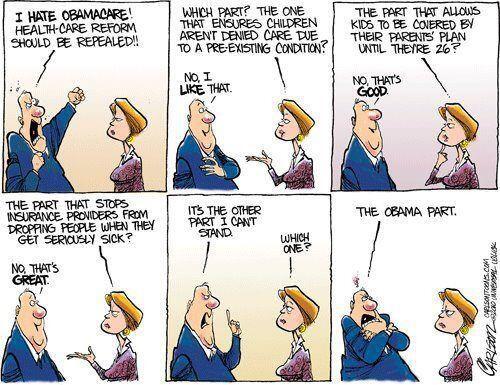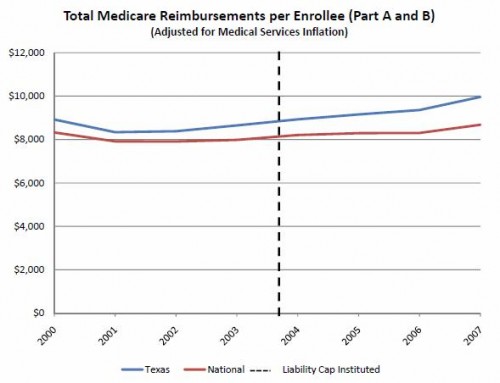A second flood, a simple famine, plagues of locusts everywhere,or a cataclysmic earthquake I'd accept with some despair.But no -- You sent us Congress.Good God, Sir, was that fair?
-- John Adams, 1776
This week everybody was talking about government shutdown
I covered that in a separate article, "Tea Trek: Into Darkness". The gist is that the current government-shutdown and debt-ceiling confrontation represents something bigger than a fight over ObamaCare. It's about the Republicans giving up on democracy and seeking to rule from the minority.
and lots and lots of nonsense about ObamaCare
Critics exaggerate the unpopularity of ObamaCare, usually by lumping together the people who want the government to do nothing to help the uninsured (i.e., most Republicans, as Ross Douthat more-or-less acknowledges) with the people who want universal insurance through a single-payer system (i.e., me).
But even to the extent ObamaCare is actually unpopular, you have to take into account that it is the most lied-about program in the history of government. If some guy wants ObamaCare repealed because Rick Santorum convinced him his special-needs child will be euthanized -- well, how much weight does that opinion deserve? How much consideration should you give to people who are against ObamaCare but support the Affordable Care Act?
Vanity Fair's Kurt Eichenwald refutes some of the most outrageous anti-ObamaCare claims, but he opens with a level of vitriol that your conservative friends will never wade through. (So send them excerpts rather than a link.) The NYT's Philip Boffey addresses the ObamaCare-is-killing-jobs argument. Gannett's Fact-Checker column gave a 0-out-of-10 rating to the truthfulness of the Congress-exempted-itself-from-ObamaCare claim.
As for various implementation glitches as the exchanges roll out on Tuesday: All large government programs have them. The difference with ObamaCare is that Republicans in Congress have refused to cooperate in the post-passage/pre-implementation process of legal fine-tuning that is usually bipartisan and uncontroversial. Any Republicans who genuinely wanted to improve the program rather than sabotage it would find Democrats more than willing to work with them.

Matt Yglesias points out the irony of Senator Cruz reading Green Eggs and Ham during his anti-ObamaCare pseudo-filibuster Tuesday: The Dr. Seuss classic is about irrational resistance to something you've never tried. If anyone is Sam I Am in this analogy it's President Obama, who knows the country will like ObamaCare if it ever gets to try it.
Posts by Middle Class Political Economist explain why two pillars of Republican health-care reform won't work.
We know selling insurance across state lines is a bad idea because we've seen this movie before with interstate banking: Rather than increase competition, banks just moved their credit-card operations to the states with the weakest consumer protections, South Dakota and Delaware. The framing of this idea is also weird, particularly for a party that claims to limit federal power: "Allowing" interstate competition is the same as "banning" states from regulating their health-insurance markets, i.e., the federal government will be the only effective health insurance regulator.
We know medical-malpractice reform won't cut costs, because 39 states have tried this kind of reform with no significant effect. Texas is the prime example.

I'll add a personal reflection on malpractice reform: The claim is that "defensive medicine" (doctors doing unnecessary tests or treatments to avoid malpractice lawsuits) drives up costs, and so legal reform can lower them. But my wife and I both believe that defensive medicine saved her life. In 1996 she had a mildly suspicious mammogram, and the radiologist recommended rescanning her in six months. But the doctor who had just changed her birth control to something riskier breast-cancer-wise (in other words, the one on the hook for malpractice) insisted on a biopsy. She had stage-2 breast cancer, which could have been stage 3 or 4 six months later.
and promising foreign-policy developments
Just a few weeks ago, I'd have said this was impossible: Friday the UN Security Council voted unanimously -- that means Russia and China too -- to make Syria give up its chemical weapons. Today, the international team that is supposed to oversee the destruction of Syria's chemical weapons is leaving from The Hague. They should arrive in Damascus tomorrow.
Now, there's a lot that can still go wrong. But so far nobody seems to be slow-rolling this process, which is what you'd expect if the critics are right and it's all some elaborate ruse to help Assad keep his weapons rather than get rid of them.
In other news, President Obama and new Iranian President Hassan Rouhani talked on the phone. That may not sound like much, but nothing similar has happened since the days of the Shah. They said nice things to each other. Will that conversation go somewhere? Unclear, but it's the first optimistic turn in US/Iranian relations in a long, long time.
and the new IPCC report on climate change
 The United Nations' Intergovernmental Panel on Climate Change (IPCC) released the first part of its Fifth Assessment report, updating the Fourth Assessment in 2007. The report itself, even just the 36-page summary for policy-makers, is dense reading for the non-scientist. Grist's John Upton , ThinkProgress' Ryan Koronowski and Quartz' Eric Holthaus summarize.
The United Nations' Intergovernmental Panel on Climate Change (IPCC) released the first part of its Fifth Assessment report, updating the Fourth Assessment in 2007. The report itself, even just the 36-page summary for policy-makers, is dense reading for the non-scientist. Grist's John Upton , ThinkProgress' Ryan Koronowski and Quartz' Eric Holthaus summarize.If you've been paying attention to the climate-change issue, there are no big shockers. Between 2007 and 2013, models get better, levels of certainty increase, and the story remains the same: By burning fossil fuels, humans are raising the level of CO2 in the atmosphere, which causes the Earth to reflect less of the Sun's energy back into space. That's causing atmospheric temperatures to increase, the ocean to get more acidic, sea levels to rise, glaciers to recede, and so on.
Holthaus calls attention to one process detail worth noting:
What makes the IPCC so important is simple: They are required to agree. Last night, the group pulled an all-nighter to ensure that representatives from all 195 member countries agreed on every single word of the 36-page “summary for policymakers” (pdf).
in a saner world, that process by itself would lay to rest the idea that there is some kind of scientific "controversy" about global warming. There are disagreements about levels of certainty, or how fast things are changing, but the scientists who spend their lives studying this stuff agree on the general outlook.
Predictably but sadly, the release of any major new scientific report about climate change is matched by climate-change deniers turning up the volume on their disinformation campaign. Debunking climate-denier disinformation soaks up a lot of scientific effort that could be better spent elsewhere, but it has to be done: here, here, here, and elsewhere.
In a move you will understand if you read the comments on any major-news-service article on the IPCC report, Popular Science announced Tuesday that its web site will no longer allow readers to comment on news stories. The reason is kind of sad: The trolls won. PopSci realized that its comment threads were promoting more ignorance than knowledge.
A politically motivated, decades-long war on expertise has eroded the popular consensus on a wide variety of scientifically validated topics. Everything, from evolution to the origins of climate change, is mistakenly up for grabs again. Scientific certainty is just another thing for two people to "debate" on television. And because comments sections tend to be a grotesque reflection of the media culture surrounding them, the cynical work of undermining bedrock scientific doctrine is now being done beneath our own stories, within a website devoted to championing science.
and you also might be interested in
When I'm not writing about politics, I write about religion. Here's my latest column for UU World.
The NSA revelations keep dribbling out. Now, the NSA is mapping social connections between Americans. In theory, the NSA is only supposed to spy on foreigners and Americans who have some connection to terrorism investigations. But more and more it looks like that's just about everybody. It's a six-degrees-of-Bin-Laden game.
In other NSA news, NSA head General Keith Alexander refused to give a straight answer to Senator Wyden's question of whether the NSA uses GPS data from American cell phones to track people. The larger theme of Senator Wyden's tenure on the Senate Intelligence Committee has to do with his frustration about knowing secrets that he can't tell the public, even though the public ought to know. So probably this interaction is about Wyden trying and failing to get something into the public record that he already knows is true.
New laws in Texas really are keeping people from voting. ThinkProgress tells the story of 84-year-old Dorothy Card, whose legal-aide daughter is making a fourth attempt to get Dorothy a voter-ID card.
Remember how for several years the economy would seem to be coming back in the winter only to sputter in the summer? Turns out that was a glitch. The 2008-2009 crash happened in the winter, so for three years after that the seasonal-adjustment algorithm tried to seasonally adjust to another crash. When the economy didn't re-crash in the subsequent winters, the seasonal adjustment made it look like it was doing great. The algorithm would then smooth things out by making the summer look bad.
I know, I know: The reporting system can't be that stupid, can it? Looks like it could. Major policy decisions were based on recoveries and set-backs that never really happened.
The early skirmishes of 2016 are taking place in image-making feature articles.
Liberal Democrats (i.e., people like me) are torn: As in the 2008 cycle, Hillary Clinton is the early favorite. In terms of name recognition and public respect, she looks like the Democrats' strongest candidate to keep the White House, particularly if she can sail through the primaries without a serious challenge. She'd also rally the women's vote, which has to be an important part of any Democratic strategy.
OTOH, Clinton would carry forward everything I (and folks like Jonathan Chait) dislike about Obama: the surveillance state, kowtowing to Wall Street, and so on. The presidency of her husband, Bill (The-Era-of-Big-Government-is-Over) Clinton, was a time of peace and relative prosperity, but it left us with a low-expectations liberalism that was content to watch the 1% capture all the economic growth.
That ambivalence is playing out in feature articles. Without discussing 2016 directly or putting forward somebody to run against her, what if we remind everyone of the downside of Clintonism and see if that story takes off? So New Republic has an article about sleazy Clintonista Doug Band, while New York Magazine runs a more positive Hillary profile.
and let's end with something to make you smile
The New York Times Magazine has a wonderful article about a 103-year-old New Yorker who still enjoys fine restaurants.
"Maybe because I’m eating alone at my age, people at other tables start conversations,” he said. Yes, he tells them, he lives alone, in a modest studio apartment on West 57th Street in Manhattan, and he always eats dinner out, always orders the fish. “They always ask my age, and I often lie and tell them I’m 90,” he said. “If I tell them my real age, it becomes the whole subject of conversation and makes it look like I’m looking for attention, which I’m not.”
No comments:
Post a Comment